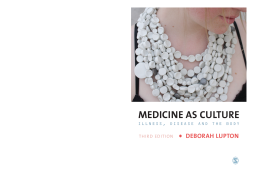
Additional Information
Book Details
Abstract
Lupton's newest edition of Medicine as Culture is more relevant than ever.
Trudy Rudge, Professor of Nursing, University of Sydney
A welcome update of a text that has become a mainstay of the medical sociologist's library.
Alan Radley, Emeritus Professor of Social Psychology, Loughborough University
Medicine as Culture introduces students to a broad range of cross-disciplinary theoretical perspectives, using examples that emphasize bodies and visual images. Lupton's core contrast between lay perspectives on illness and medical power is a useful beginning point for courses teaching health and illness from a socio-cultural perspective.
Arthur Frank, Department of Sociology, University of Calgary
Medicine as Culture is unlike any other sociological text on health and medicine. It combines perspectives drawn from a wide variety of disciplines including sociology, anthropology, social history, cultural geography, and media and cultural studies. The book explores the ways in which medicine and health care are sociocultural constructions, ranging from popular media and elite cultural representations of illness to the power dynamics of the doctor-patient relationship.
The Third Edition has been updated to cover new areas of interest, including:
- studies of space and place in relation to the body
- actor-network theory as it is applied in research related to medicine
- The internet and social media and how they contribute to lay health knowledge and patient support
- complementary and alternative medicine
- obesity and fat politics.
Contextualising introductions and discussion points in every chapter makes Medicine as Culture, Third Edition a rigorous yet accessible text for students.
Deborah Lupton is an independent sociologist and Honorary Associate in the Department of Sociology and Social Policy, University of Sydney.
Medicine as Culture introduces students to a broad range of cross-disciplinary theoretical perspectives, using examples that emphasize bodies and visual images. Lupton's core contrast between lay perspectives on illness and medical power is a useful beginning point for courses teaching health and illness from a socio-cultural perspective
Arthur Frank
Department of Sociology, University of Calgary
This new edition of Medicine as Culture is a welcome updating of a text that has become a mainstay of the medical sociologist's library. Providing a clear statement of the emergence and role of medicine in cultural contexts, Deborah Lupton offers excellent summaries and comparisons of the major theoretical perspectives that illuminate our understanding of illness, the body and its social care. Students and teachers will appreciate the clarity and organisation of this book, which confirm it as a leading text in its field
Alan Radley
Emeritus Professor of Social Psychology, Loughborough University
Deborah Lupton's discourse analysis of contemporary writing on medical knowledge, exposes how medical discourses are not neutral, objective advisories on how we are to live our lives but rather culturally constitutive of our bodies and ways of thinking and talking about health and illness. In Australia today, if you turn on day-time television, you will note that a medical 'show', The Doctors has replaced Oprah as arbiter of how to live healthily, what we are to know about bodily health and which medical discoveries are to be trumpeted from news bulletins across multiple forms of media. Such media representations of authoritative, medicalised health signify that Deborah Lupton's newest edition of Medicine as Culture is more relevant than ever! Her lucid analyses of biomedicalisation furnish fresh insights and cogent critiques of the allure of, and challenges to medical power in the 21st Century - an already influential work updated and renewed - for all forms of health professional and researcher
Trudy Rudge
Professor of Nursing, University of Sydney
